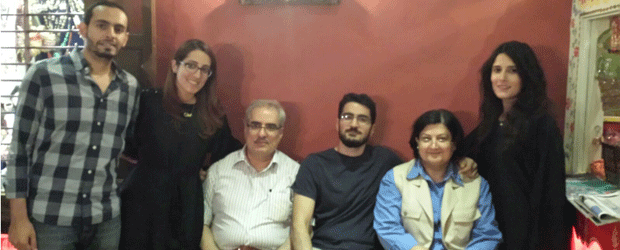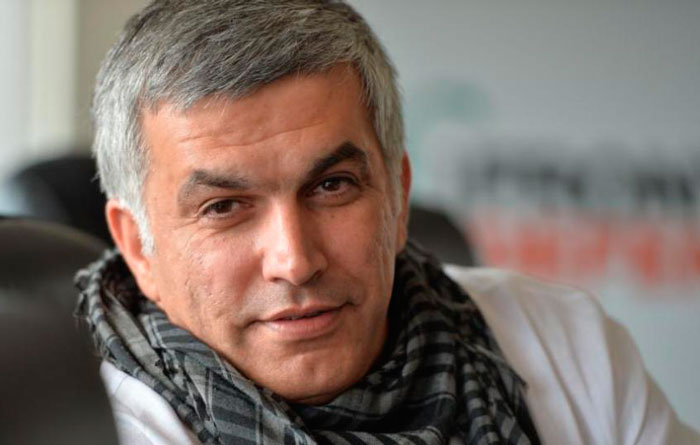Index relies entirely on the support of donors and readers to do its work.
Help us keep amplifying censored voices today.
[vc_row][vc_column][vc_column_text]

Ebrahim Sharif, third from left, Farida Ghulam, second from left, and family.
Farida Ghulam, the wife of Ebrahim Sharif, the former secretary-general of Bahraini opposition group National Democratic Action Society (Wa’ad), has written an open letter to political and human rights institutions worldwide calling for solidarity against the dissolution of Wa’ad.
Written on behalf of the secular political party, Ghulam’s letter asks for national figures, Arab organisations and international institutions to help “protect the little remaining freedoms enjoyed by Bahrainis that have been undermined over the past few years”.
On 6 March 2017, the Ministry of Justice filed a lawsuit calling for the dissolution of Wa’ad following a statement made by the political societies of the National Democratic Movement, a secular group of which Wa’ad is a part, demanding a “comprehensive national consensus to end the political and constitutional crisis” in Bahrain.
The Ministry of Justice, the body administratively responsible for political organisations in Bahrain, has accused Wa’ad of “advocating violence” and supporting an “environment that incubates terrorism”, arguing that statements made by the political societies represented a departure from established principles.
The first hearing of the case against Wa’ad took place on the 20 March 2017 and the final hearing is scheduled for the 17 April 2017, with a judgment expected to be passed within one month.
The time of the comments made by the National Democratic Movement marks six years since the end of the pro-democracy movement in Bahrain, which saw numerous protests take place in opposition to the repressive government.
The authorities’ retaliation to the peaceful demonstrations of its citizens resulted in the injury of more than 30 protesters. Recent years have seen an increase in government repression, arrests — with many tried in military courts — and revocation of citizenship for hundreds of Bahrainis.
The US State Department has recorded the continued violation of human rights in the Arab nation and the Bahraini authorities’ preferred use of security measures over the pursuit of diplomatic solutions obtained through a negotiated political settlement. The political climate in Bahrain has led to increased hardships for the country’s citizens, amplified by an economic crisis.
Wa’ad, the first established secular party opposition in Bahrain, questions the legitimacy of the current Bahraini constitution. It upholds the principles of democracy, equality and freedom of thought and belief. Despite its failure to win any seats in the 2006 parliamentary elections, Wa’ad, led by Sharif between 2005 and 2012, has retained a high media profile.
Ghulam’s letter indicates that the Ministry of Justice has purposely failed to refer to key documents, statements and positions taken by Wa’ad and other opposition groups in building its case, including the Manama Document issued in October 2011 and the Declaration of Principles of Nonviolence presented in November 2012. This confirms Wa’ad’s commitment to “peaceful means, rejection of violence and adoption of dialogue and consensus building to find solutions in political differences”.
Ghulam also says that the authorities have taken and interpreted words from Wa’ad statements “at will and out of context”.
Actions taken by the Bahraini authorities to dissolve Wa’ad follow their crackdown on opposition parties since the mass protests of 2011, with two other opposition groups dissolved as a result of similar lawsuits. Islamic Action Association (Amal) was brought to an end in 2012 and its secretary-general, Sheikh Mohammed Ali Almahfood, was given a five-year prison sentence. 2016 saw the dissolution of the nation’s largest political organisation, Al-Wefaq National Islamic Society. Secretary-general Sheikh Ali Salman was sentenced to nine years in prison. The citizenship of the group’s spiritual leader, Sheikh Isa Qasim, was also revoked.
In addition to actions taken against Wa’ad, new charges were also brought against Sharif earlier this month following a series of tweets. The political activist was charged with “incitement to hatred against the regime” under article 165 of Bahrain’s penal code following messages posted on his Twitter account.
The former Wa’ad leader was imprisoned and tortured in 2011 for his role in campaigning against Bahrain’s political regime alongside a group of other human rights advocates known as the Bahrain 13. He was rearrested in 2015 a few weeks after his initial release, following a speech where he called for sustained peaceful opposition against the country’s authorities.
Sharif also faced charges in November 2016 after comments he made to the Associated Press regarding Prince Charles’ visit to Bahrain, although these were later dropped. He now faces a further three years in prison.
[/vc_column_text][/vc_column][/vc_row][vc_row][vc_column][vc_basic_grid post_type=”post” max_items=”4″ element_width=”6″ grid_id=”vc_gid:1492096403121-1bd99655-9b6e-3″ taxonomies=”716″][/vc_column][/vc_row]
[vc_row][vc_column][vc_column_text]As attention focuses on Bahrain ahead of the annual Formula One Grand Prix on 14-16 April, Index urges political leaders internationally to speak out against human rights abuses in the country.
Index is particularly troubled by the treatment of prominent human rights defender Nabeel Rajab, who was arrested in June 2016 on multiple charges related to his media activities and peaceful expression online.
Last week, Rajab underwent surgery in hospital and was returned almost immediately to solitary confinement. For two days, he was forced to wear dirty clothes covered in blood and he still lacks access to any proper medical care while in jail despite a deep and open wound that causes severe pain and needs constant care.
“We call on the Bahraini government to end its inhumane treatment of Nabeel Rajab, who is being persecuted for simply exercising his right to peacefully express his opinion,” Index on Censorship chief executive Jodie Ginsberg said.
“Countries like Britain that enjoy such freedoms need to speak out more forcibly when such rights are denied to individuals elsewhere,” she added.
Rajab, a 2012 winner of the Index on Censorship Freedom of Expression Awards, was supposed to be freed on bail in December 2016 after nearly seven months in jail. However, he was re-arrested and remanded into custody for seven days, on charges related to media interviews he gave in 2015. Rajab has been in police custody since 13 June, when he was arrested and later charged with “spreading false news and rumours about the internal situation in a bid to discredit Bahrain.”
Rajab, president of the Bahrain Center for Human Rights, has been in pre-trial detention since his arrest in June. His detention, much of it in solitary confinement, has caused a deterioration in his health.
Bahrain appears to be intensifying a crackdown on journalists and human rights campaigners in the country.
On 23 April 2017, the court of appeals will hold a hearing for Sayed Ahmed Salman al-Mousawi, an internationally-renowned photographer, who was arrested more than three years ago for alleged terrorist activities.
Index is also concerned about the targeting and persecuting of a human rights defender’s family as means of intimidation. These retaliatory measures include the detention of the mother-in-law and brother-in-law of the UK-based Bahraini activist Sayed Ahmed Alwadaei. Both were taken into custody by the Bahraini authorities and their detentions were renewed on 6 April for 30 days.[/vc_column_text][/vc_column][/vc_row][vc_row][vc_column][vc_basic_grid post_type=”post” max_items=”10″ style=”load-more” items_per_page=”4″ element_width=”6″ grid_id=”vc_gid:1491928102591-8e234634-c0a1-1″ taxonomies=”716″][/vc_column][/vc_row]
Bahrain’s decision to file charges against Ebrahim Sharif underscores the country’s tactical use of judicial harassment to suppress freedom of speech.
Ebrahim Sharif, the former secretary-general of the secular opposition group National Democratic Action Society (Wa’ad), was charged with “inciting racial hatred against the regime” under article 165 of Bahrain’s penal code. The alleged offenses stem from tweets Sharif posted.
“As we have seen in Bahrain’s treatment of human rights activist Nabeel Rajab, the charges against Ebrahim Sharif target freedom of expression in an attempt to stifle even the mildest criticism,” Melody Patry, head of advocacy, Index on Censorship said.
In the charges the public prosecution office quoted one of Sharif’s tweets: “The ministry of justice threatens to dissolve the remaining opposition societies because they ‘lost the fundamentals of political activity.’ What remains of the decor of the democratic state?”
The prosecution alleges that the use of the word “decor” implies that there is no democracy in Bahrain, a crime according to them.
The prosecution is also citing three other Twitter conversations: an exchange in which Sharif reminded the Tunisian interior minister, who had demanded respect for Bahraini sovereignty, that Tunisia’s ousted president Ben Ali had expressed the same sentiment to repress the opposition during the Arab spring; a series of tweets about protester Abdulla Alzjooz, who Sharif referred to as a “martyr”; and a retweet of an Amnesty International poster commemorating the 6th anniversary of the arrests of leaders of the 14th February movement, with which Sharif included a message of respect.
The Bahrain Institute of Rights and Democracy reported that it is currently unclear whether the case will be transferred to the courts, or if the government has imposed a travel ban on the political leader, who was previously imprisoned from 2011 to 2015, and then again from 2015 to 2016 on similar charges stemming from his involvement in the pro-democracy movement and speeches he delivered. He could now face up to three more years in prison.
The charges against Sharif came on the same day a Bahraini court heard opened dissolution proceedings against Wa’ad. he Bahraini government is accusing Wa’ad of inciting violence and filed for the group’s dissolution earlier in March, though it provided no evidence of its allegations. Wa’ad’s lawyers requested time to respond to the charges, and the next court date is set for 17 April 2017.
[vc_row][vc_column][vc_column_text]
The trial of jailed Bahraini human rights activist Nabeel Rajab on charges of spreading “rumours and false news” was deferred for a second time on 7 March until 16 April. The charges relate to televised interviews in 2014 and 2015 in which he criticised authorities. In the meantime, he remains in detention after being denied bail.
This is one of two separate trials Rajab faces. The other is over tweets and retweets about the war in Yemen, which his accusers say “spread rumours in wartime”, insulted a neighbouring country (Saudi Arabia) and offended a statutory body within Bahrain. This trial has been postponed 11 times.
If convicted on all charges, Rajab faces up to 18 years in prison.
Sayed Ahmed Alwadaei, director of advocacy at Bahrain Institute of Rights and Democracy, said: “Bahrain is persecuting Nabeel Rajab for his speech. They would rather jail the messenger on human rights and double-down on repression than listen to what he has to say. The international community must take a stance.”
In February 2017 the European Parliament passed a resolution urging the EU and its member states “to intervene with the Bahraini Government in order to appeal for the release of Nabeel Rajab and of all those held solely on the basis of their peaceful exercise of freedom of expression and assembly”.
Rajab is the winner of a 2012 Index on Censorship Freedom of Expression Award for his efforts against human rights violations by the Bahraini government in 2011. He judged the Index on Censorship Freedom of Expression Awards last year and is also the president of the Bahrain Centre for Human Rights.
Previously, Rajab had been arrested and sentenced to five years in prison in 2012 for criticising Bahraini authorities and for leading pro-democracy demonstrations. He has faced serious health problems due to his numerous detentions, which often were marked by solitary confinement and unclean conditions.
Bahrain regularly breaches basic human rights, and the persecution of Rajab is merely one example of the unjust treatment of those who attempt to exercise their freedom of expression within the country. Authorities have been taking increasingly harsh measures to prevent and punish dissent in the country.[/vc_column_text][/vc_column][/vc_row][vc_row][vc_column][vc_basic_grid post_type=”post” max_items=”4″ element_width=”6″ grid_id=”vc_gid:1489420587513-b30cc26d-4ec8-5″ taxonomies=”716″][/vc_column][/vc_row]